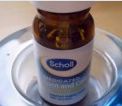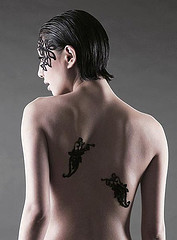
L'Occitane Ice Hand Cream This is not the usual hand cream.Not creamy, greasy or even moisturising.No, non...
Not for the prudes please Like a littlered hotsexymini dressmaybe? And thatspretty tame going by what you ...
3.1 Phillip Lim The elaborate blond wood Moorish arches at the mouth of the runway were an obvio...
Good Shot Who: Zani Gugelmann What: Santo, her new collection of 18-karat-white-gold, bull...
Are you addicted to your Ive read about lip balm addiction sometime back but forgot about it until now wh...
Can you use body lotion o Why would anyone want to use their hand lotion or body moisturizer on their face...
Buying mineral makeup in A few people have emailed me asking where they can obtain mineral makeup in Sing...









Sure, the spa at Los Angeles’ newly revamped Sofitel hotel boasts 20-head Swiss rainfall showers and zebrawood-paneled VIP nooks with rainbow-lit chromatherapy tubs. But with a bath butler on hand to fill your tub with the sort of cocktail that would make poor old Mr. Bubble blush—skin-softening powdered milk; a blend of ylang-ylang, jasmine, and plumeria essential oils; and a sprinkling of jasmine or hibiscus blooms (depending on what’s in season) to bob soothingly along beside you—why bother poking one terry-cloth-slippered toe outside your hotel suite?
“Spa baths are making a comeback,” asserts Noella Gabriel, who spends her days dreaming up ever-more-decadent products and treatments for the spa brand Elemis. “Women used to say, ‘Why am I sitting around in the tub for half an hour? I could do that at home!’” These days, sybarites are more than happy to be dunked in hot water for 20 or 30 minutes before, say, a hot-stone massage, and with good reason: Though they might not feel it while submerged, they sweat due to the heat, prompting the release of toxins. The high temperature also increases blood flow to muscles and joints, reducing ache-inducing inflammation—and exponentially upping the benefits of whatever indulgence is to follow.
“The more you loosen and ease the muscles before a massage, the more you can stretch them during it,” Gabriel says. But bath time’s most unique benefits may be mental. Since the body itself is up to 70 percent water, immersing it in H2O provides “an incredibly nurturing, homecoming, safe sort of feeling that we get nowhere else,” Gabriel says, describing the oversize “slipper baths” some spas are installing, in which knees are supported to subtly replicate the tucked-up pose of a child in the womb. “In them, water laps against the body, creating a constant, relaxing vibration. Everybody, irrespective of size, feels cocooned and safe,” she says. These benefits may well outlast the dip itself. In a small Japanese study published last year, researchers who tested participants’ saliva for cortisol and chromogranin A (two chemical giveaways of stress) before and after each of a series of spa baths found that the aquatic sessions reduced both in those who started out with elevated anxiety levels.
While its exact mechanism is not fully understood, spiking the body’s core temperature results in a deeper, more uninterrupted sleep, doctors suspect, because it helps rejigger the body’s circadian rhythm; i.e., it elevates the body to its ideal pre-sleep temperature. In one study, Cynthia Dorsey, PhD, director of behavioral sleep medicine at Sleep Health Centers in Bedford, Massachusetts, found repeated evening baths comparable to taking prescription sleep aid zolpidem (generic Ambien). “Baths are just one of the therapies I suggest to my patients—they’re not a cure for insomnia,” Dorsey says. “But it’s good to know there are alternatives to medication.” Since some people feel energized directly after bathing, health and nutrition guru Andrew Weil, MD, suggests steeping at least an hour before bed; he also says a quick spray of cold water before climbing out of the bath will, ironically, help retain warmth by closing pores and stopping sweating.